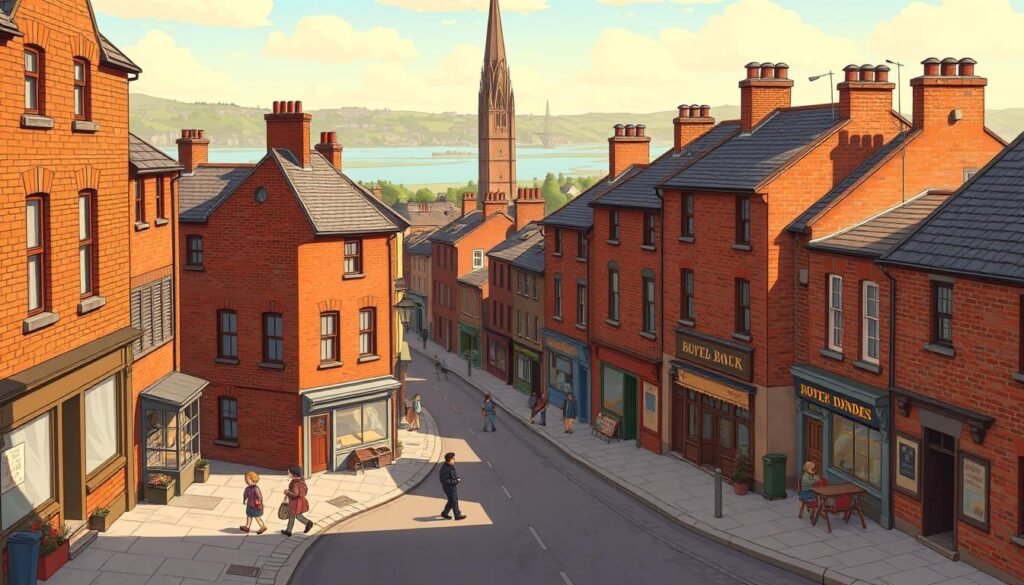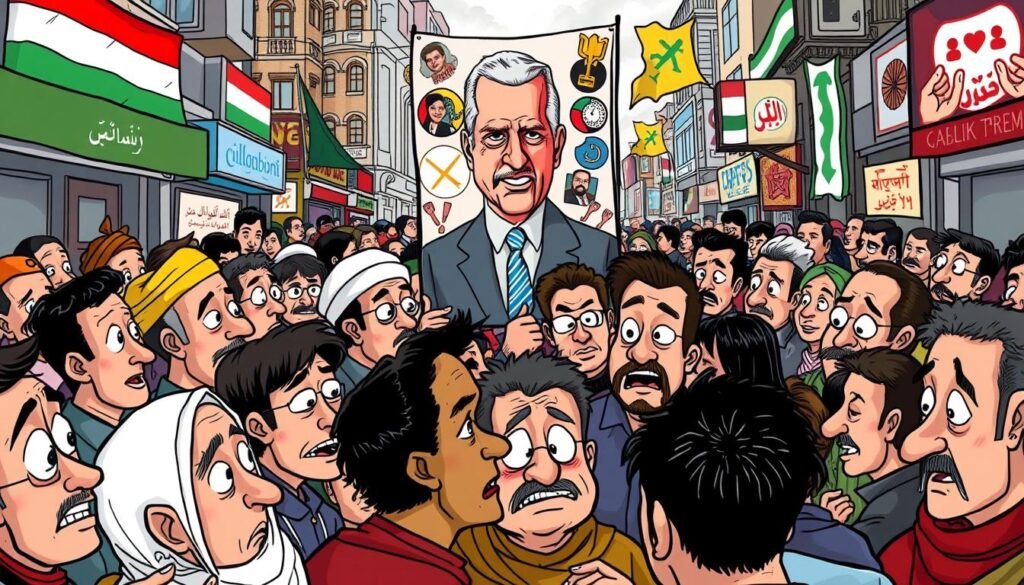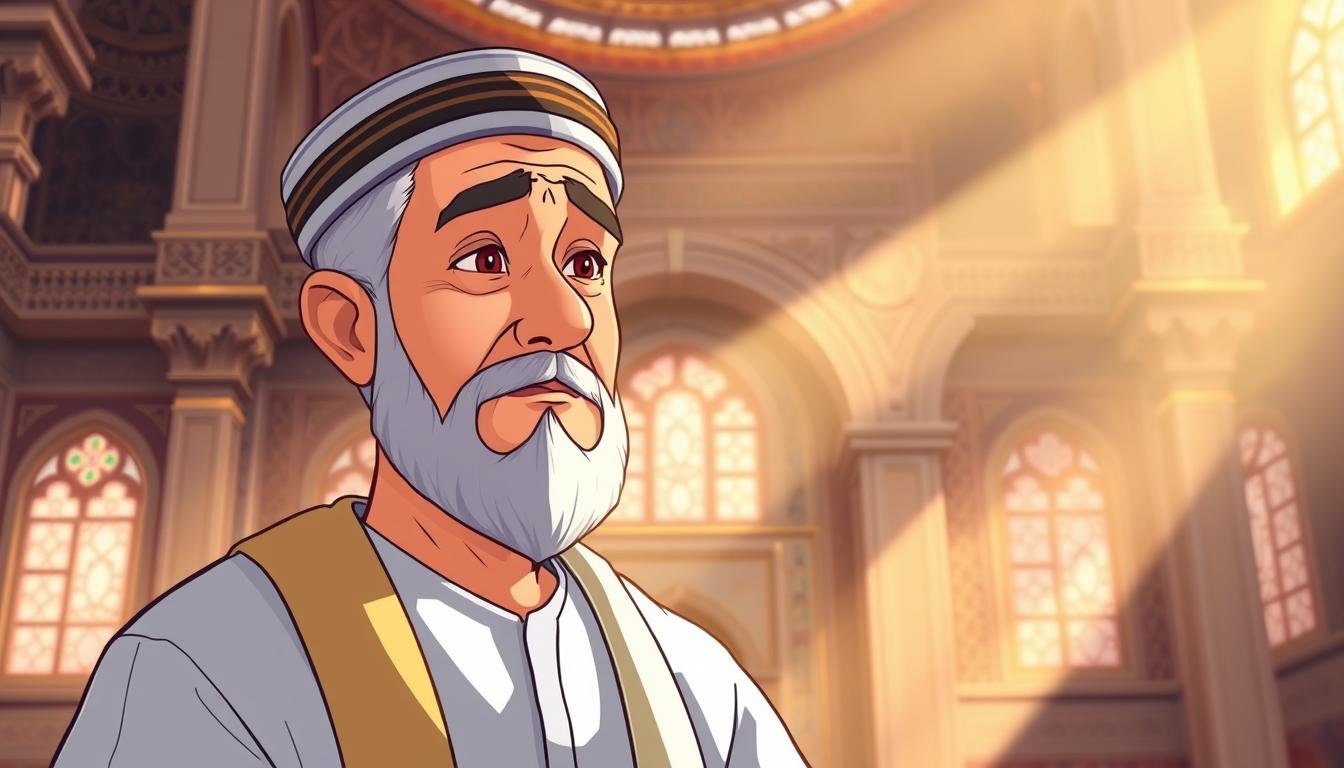Do we really get how personal beliefs mix with public image? This question is big when we talk about George Galloway. He’s a big name in British politics. His switch to Islam and how he deals with religious identity amidst controversy is complex.
We’ll look into George Galloway’s faith, especially his Muslim conversion. We’ll see how it affects his political path and how people see him. With 30% of Rochdale’s people being Muslim and many supporting him, how does his faith shape his political role?
Introduction to George Galloway
George Galloway is a key figure in British politics today. He has spent years fighting for causes that many Muslims care about. Born on August 16, 1954, in Dundee, Scotland, he has moved through different political parties.
His journey shows his ability to adapt and his passion for helping those who are overlooked. As a Member of Parliament, he has won elections several times. This shows he can connect with voters, especially in places like Bradford West.
Bradford West is known for its diverse population. Galloway’s work there highlights his understanding of local issues. He knows how important mosque communities are in politics.
Looking at George Galloway’s life, we see activism, controversy, and a strong will. He talks openly about things like Palestinian rights. He has run for office under different names, like the Workers Party of Britain.
Even though he didn’t always speak much in parliament, his campaigns were powerful. In 2012, he won 56% of the vote in Bradford West. This success makes us think about his career and its impact on British politics.
George Galloway’s Political Journey
George Galloway’s career in politics has seen many changes and achievements. He started with the Labour Party and became a Member of Parliament in 1987. He represented Glasgow Hillhead and was re-elected three times.
In 2024, he returned as an MP. His early career was marked by being the youngest chair of the Scottish Labour Party in 1981. This showed his strong commitment to left-wing causes.
In 2003, he left the Labour Party because of his opposition to the Iraq War. He then started the Respect Party in 2004. As its leader from 2013 to 2016, he tried to bring together different left-wing groups.
The Respect Party had about 10,000 members, though it never reached its peak. Galloway won a big victory in Bradford West in 2012, getting 75% of postal votes. This made the party more known.
In 2019, he started the Workers Party of Britain. This move aimed to make left-wing ideas stronger in UK politics. Galloway’s journey shows his dedication to his beliefs, even through tough times.
Early Life and Background
George Galloway grew up in Dundee, which shaped his views on Scottish politics. He was born on August 16, 1954, to a working-class family. His father, a trade unionist, taught him about socialism and activism.
He started his political career over 50 years ago. He was involved in raising the Palestinian flag in 1980. This showed his dedication to social justice.
He joined the Scottish Labour Party and became its youngest chair in the 1980s. In 1987, he was elected as a Labour MP for Glasgow Hillhead. This was a big step in his career.
Over time, Galloway became known for his controversial views. He won the 2005 general election for Bethnal Green and Bow. He got almost 40 percent of the votes, beating his rivals.
 This victory showed his ability to connect with people on important issues.
This victory showed his ability to connect with people on important issues.
Is George Galloway A Muslim?
George Galloway’s journey to Islam is complex and interesting. His conversion shows his personal growth and the varied reactions from the Muslim community and others.
Details of His Conversion to Islam
George Galloway became a Muslim about ten years ago in London. The ceremony was private but had many Muslim leaders there to support him. This event showed his political journey and his support for Islam.
Before, he was often seen as a Catholic. But his conversion changed how people saw him in politics and religion.
Immediate Reactions to His Conversion
People reacted differently to George Galloway’s choice to become a Muslim. Some Muslims welcomed him, seeing his support for their causes. Others were skeptical, doubting his faith because of his outspoken views.
This mix of reactions shows the ongoing debate about identity and faith in public figures today.
Controversies Surrounding Galloway’s Faith
George Galloway’s faith has sparked a lot of debate. His switch to Islam caught everyone’s attention. But the media often simplifies this complex journey.
This simplification has led to doubts about Galloway’s true commitment to Islam. His past marriages and public statements add to the skepticism.
Many question if Galloway’s Muslim ties are genuine or just for political gain. His past comments, seen as transphobic by some, add to the confusion. This makes it hard to understand his religious beliefs.
The media’s take on Galloway’s faith shapes what people think. Often, it makes things worse by highlighting differences instead of understanding.
The debates over Galloway’s faith mirror bigger talks about faith in politics. He has Muslim supporters, especially in Rochdale. His approach shows the tricky balance between pleasing religious voters and traditional political supporters.
This balance is especially challenging in today’s divided society. It shows how hard it is to mix religion and politics.
Public Perception of Galloway’s Religion
George Galloway’s Muslim identity is seen in a complex way. He openly talks about his faith in speeches and campaigns. This makes many see him as a champion of Muslim values, especially in places like Bradford.
His appeal grows as people believe he truly gets their religious and cultural concerns. This connection makes him stand out to voters.
How He Identifies Religiously
Galloway’s faith seems to match his political views, creating a unique image. He talks about Islamic principles in his speeches. This shows he’s a strong advocate for Muslim issues.
His focus on religious identity builds trust and solidarity. It’s more than being a politician; it’s about representing Muslim values.
His Influence on Muslim Communities
In places like Bradford, Galloway’s leadership is deeply trusted. His big wins, like in Bradford West, show he listens to the Muslim community. Some praise his ability to unite Muslims, while others see it as political gain.
This creates mixed feelings about his true intentions. Do he really support Muslim causes, or is it just for his career?

Galloway’s Marriages and Their Religious Context
George Galloway’s life shows a mix of personal choices and religious beliefs. He converted to Islam over a decade ago. His Galloway marriages show his deep connection with Islamic traditions, especially in two of his four marriages.
His first marriage was in 1979 to Elaine Fyffe, and they had a daughter. Then, in 1994, he married Dr. Amineh Abu-Zayyad in an Islamic ceremony. They later had a civil ceremony in 2000. Their divorce in 2009 shows the challenges of Islamic marriage.
In 2007, he married Rima Husseini in an Islamic ceremony. His latest marriage to Putri Gayatri Pertiwi in 2012 shows his ongoing commitment to Islamic values. His marriages highlight the religious implications of Islamic law, especially for Muslim women marrying non-Muslims.
Galloway’s choices reflect his commitment to Islamic values. Yet, they also face public scrutiny. His relationships mirror the wider debate on Islamic marriage and its acceptance in Western societies.
Galloway’s Stance on Middle Eastern Politics
George Galloway has always spoken out against Western military actions in the Middle East. Many people agree with him on this. His views on the Iraq War led to him being kicked out of the Labour Party in 2003.
This move made him known for standing up to the establishment. He has been a strong voice for those who feel left out.
In places like Rochdale, Galloway talks about issues that affect Palestinians. About 18 percent of Rochdale’s people are Muslim. This support helped him win big in the 2012 Bradford West election.
In the recent Rochdale by-election, Galloway’s views on the Israel-Hamas conflict got a lot of attention. He got almost 40% of the vote, even though Labour didn’t run. This shows how important Middle Eastern issues are to voters.
Galloway’s message has drawn many supporters. But, some wonder if this support will last. His success might be partly because Labour didn’t run. The Gaza conflict is very divisive in Britain, which could affect Galloway’s future in politics.
The Role of Religion in His Political Campaigns
George Galloway has used religion in his campaigns. He made a faith-based appeal that many voters found compelling. His win in Bradford West showed how well this worked.
He got married in a Muslim ceremony soon after winning. This made him a key figure in Muslim affairs. Yet, he hasn’t publicly said if he converted to Islam a decade ago. This adds to the mystery of his political identity.
Muslim women in Bradford were key to his success. They helped him win big. But, his comments on sensitive topics, like rape, upset some of his supporters.
He tried to explain his views in a political way. But this didn’t calm the concerns of many.
Despite a big win, using religion in politics is a tricky strategy. Galloway’s campaigns often focus on divisive issues. At the same time, he tries to win over local Muslim support. This makes it hard for him to please everyone.
Media Coverage of Galloway’s Faith
George Galloway’s faith has gotten a lot of media attention. This attention has ranged from detailed looks to outright ignoring. The Galloway media representation often talks about his Catholic background. But it rarely mentions his switch to Islam, a big part of who he is.
More than ten years ago, Galloway changed his faith in Kilburn, London. Yet, the media often looks back at his past instead of his current beliefs. This can change how people see him.
Islam in British media often faces stereotypes and simple views. Galloway’s story is no exception. Some stories focus on his past as a Catholic, not his Muslim beliefs. This is important because people often vote based on faith.
Some media question if Galloway really changed his faith. There are reports that doubt his connection to the Muslim community. This makes it hard to understand his faith in politics.
George Galloway’s faith is often looked at for its shock value, not its real meaning. His choice not to share details of his faith adds to the mystery. This shows how media can miss the mark on what someone truly believes.
Conclusion: Understanding the Man Behind the Controversy
George Galloway is a complex figure in politics. His beliefs are deeply connected to his faith. This shows us a layered reality.
Cultural views of Galloway are shaped by his views, faith, and politics. The recent by-election in Rochdale is a good example. About 20 percent of voters are Muslim.
Galloway fights for Palestine, but not all Muslim voters support him. The political scene is diverse. There are challenges from Simon Danczuk and Paul Ellison.
His win in Rochdale shows his impact. It’s important to understand his role in politics. This includes looking at community demographics and feelings.
Looking at George Galloway in depth helps us see his good and bad sides. His faith and politics are complex. This helps us understand him and his place in society.
FAQ
Is George Galloway a practicing Muslim?
What was the public’s reaction to Galloway’s conversion to Islam?
How has Galloway’s faith influenced his political career?
What controversies surround George Galloway’s faith?
How does media coverage portray Galloway’s religion?
What are Galloway’s notable positions on Middle Eastern issues?
How does Galloway’s marital history relate to his religious beliefs?
What strategies does Galloway use to connect with Muslim voters?

Embracing Faith, One Insight at a Time!
The teachings of the Quran have always guided my path. With a deep passion for Islamic knowledge, I strive to blend the wisdom of tradition with the relevance of today, making the timeless messages of Islam accessible and meaningful for everyone.
Muslim Culture Hub is my platform to share historical insights and thought-provoking articles, exploring both well-known and lesser-discussed aspects of Islamic culture and beliefs. My mission is to create an inclusive online space where everyone can learn, strengthen their faith, and connect with the profound message of Islam.
Join the journey!
May peace be upon you.








